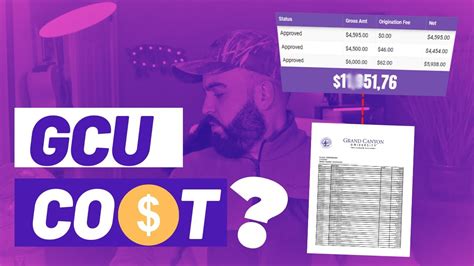With the increasing cost of higher education, navigating the complexities of university tuition can be a daunting task. Grand Canyon University (GCU) is a renowned institution offering various academic programs, but understanding its tuition structure and exploring strategies for managing expenses is crucial for prospective students and their families. This comprehensive guide will delve into the intricacies of GCU university tuition, providing insights and effective strategies to help you optimize your educational investment.

Understanding GCU Tuition Structure
GCU employs a flexible tuition model that caters to different student needs and academic pursuits. Students can choose between undergraduate, graduate, and doctoral programs, each with varying tuition rates.
Undergraduate Tuition
- Traditional Undergraduate: This program offers a traditional on-campus experience. Tuition ranges from $17,544 to $20,206 per academic year (fall and spring semesters).
- Accelerated Undergraduate: Designed for working adults, this program offers flexible schedules and hybrid delivery methods. Tuition for accelerated programs is $525 per credit hour.
- Online Undergraduate: Students can pursue their degrees entirely online. Tuition for online undergraduate programs is $455 per credit hour.
Graduate Tuition
- Master’s Programs: GCU offers a wide range of master’s degrees, with tuition ranging from $1,045 to $1,240 per credit hour.
- Doctoral Programs: Students can earn doctoral degrees in various disciplines. Tuition for doctoral programs is $995 per credit hour.
Factors Influencing Tuition Costs
Several factors can influence the tuition rates at GCU. These include:
- Program Type: The type of program (traditional, accelerated, or online) impacts the tuition charges.
- Course Load: The number of credit hours taken per semester affects the overall tuition cost.
- Academic Level: Tuition rates vary depending on whether you are pursuing an undergraduate, graduate, or doctoral degree.
- Student Status: Part-time or full-time students have different tuition rates.
- Additional Fees: Apart from tuition, students may incur fees for registration, technology, and other university services.
Effective Strategies for Managing GCU Tuition Costs
Navigating the financial complexities of university tuition requires strategic planning. Here are some effective strategies to consider:
- Research Scholarships and Grants: Explore various scholarship and grant opportunities offered by GCU. These awards can significantly reduce tuition expenses.
- Maximize Financial Aid: GCU offers a range of financial aid options, including federal grants, student loans, and institutional scholarships. Apply for financial aid to cover a portion of your tuition.
- Consider Part-Time Enrollment: If possible, consider enrolling part-time to spread out tuition payments over a longer period.
- Negotiate Tuition: GCU may be willing to negotiate tuition rates based on your financial circumstances or academic performance.
- Explore Payment Plans: GCU provides flexible payment plans to help students manage their expenses. Contact the university to discuss your options.
Why GCU Tuition Matters
Understanding GCU tuition matters for several reasons:
- Informed Decision-Making: It allows prospective students and their families to make informed decisions about their educational investments.
- Financial Planning: Accurate tuition information helps students plan their finances and avoid financial strains during their academic journey.
- Financial Aid Eligibility: Knowing tuition costs is essential for determining financial aid eligibility and maximizing your financial assistance.
Benefits of GCU’s Tuition Structure
GCU’s tuition structure offers several benefits:
- Flexibility: Flexible tuition models cater to different student needs and learning preferences.
- Affordability: GCU strives to make education affordable through scholarships, grants, and payment plans.
- Quality: GCU is committed to providing a high-quality education, ensuring that students receive value for their investment.
Frequently Asked Questions (FAQs)
-
What is the average cost of tuition at GCU?
– The average undergraduate tuition cost is $18,875 per academic year. -
Is financial aid available at GCU?
– Yes, GCU offers various financial aid options, including scholarships, grants, and student loans. -
Can I negotiate tuition with GCU?
– Yes, you may be able to negotiate tuition rates based on your financial circumstances or academic performance. -
What are the deadlines for paying tuition?
– Tuition payments are due by the first day of each semester. -
Can I pay my tuition in installments?
– Yes, GCU offers flexible payment plans to help students spread out their tuition payments. -
What is the refund policy for tuition?
– The refund policy varies depending on the program and the date of withdrawal. Contact the university for specific details.
Conclusion
Navigating GCU university tuition requires careful planning and exploration of various strategies. By understanding the tuition structure, factors that influence tuition costs, and effective strategies for managing expenses, prospective students can make informed decisions and optimize their educational investment. GCU’s flexible tuition models, combined with its commitment to affordability and quality education, provide a valuable opportunity for students to pursue their academic aspirations.
